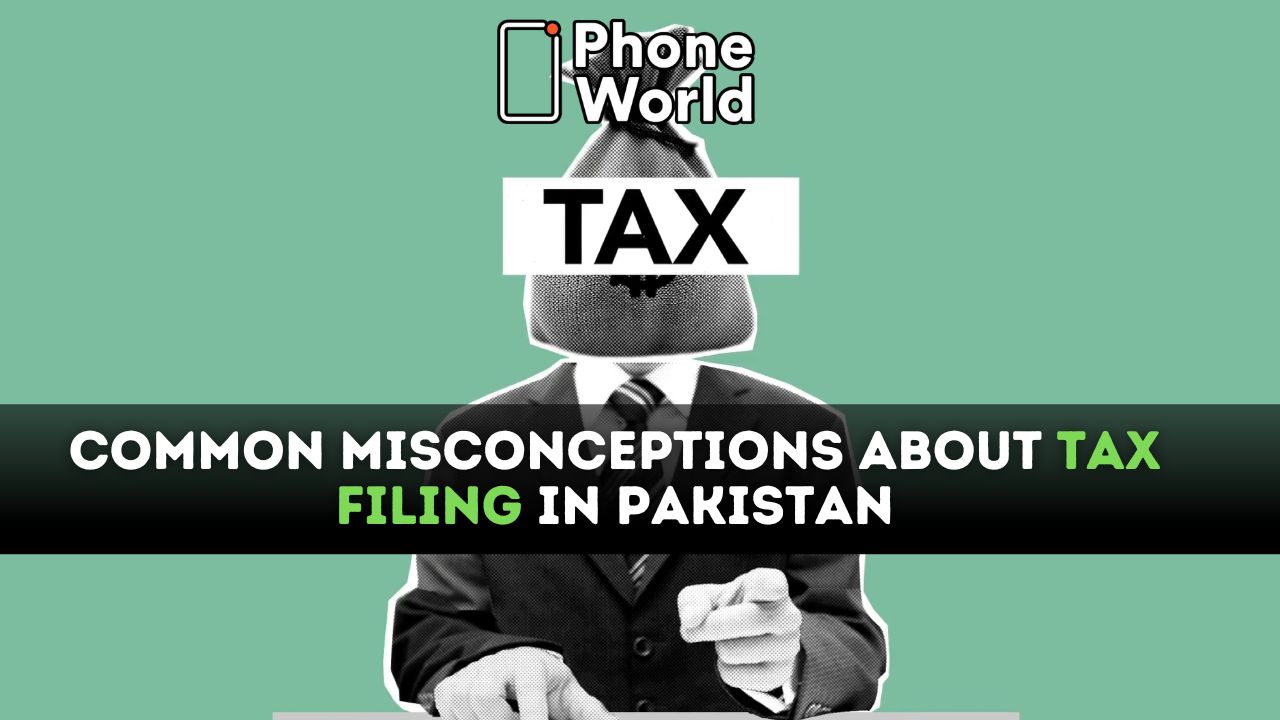Common Misconceptions About Tax Filing in Pakistan
Breaking Myths: Misconceptions and Myths about Tax Filing in Pakistan

When it comes to navigating the complexities of Pakistan’s tax filing system, people frequently have a number of misconceptions about tax filing in Pakistan. It can lead to unwarranted fears and prevent them from being financially responsible. Due to these misconceptions, individuals do not even bother to know how to become tax filers in Pakistan. In order to cultivate a transparent and well-informed approach to taxation, it is vital to have an understanding of these misconceptions. The purpose of this investigation is to shed light on the widespread misunderstandings that surround the process of paying taxes in Pakistan. The end goal is to enable individuals to approach the procedure with self-assurance and a thorough comprehension of the financial responsibilities that are placed on them.
Common Misconceptions about Tax Filing in Pakistan
Tax filing can be a perplexing subject for many people in Pakistan. It is often shrouded in myths and misconceptions about tax filing that deter individuals from fulfilling their financial responsibilities. Let’s get to the bottom of the tax filing environment in Pakistan by highlighting misconceptions about the tax filing process in Pakistan.
- Not Enough Income To File Taxes
- Tax Filing Is For Business Owners Only
- No Need To Declare Foreign Income
- Complicated Tax Filing Process
- Fear of Audit
- No Revisions in Tax Returns
- No Benefits For Tax Filers
- Taxes on Gifts and Inheritances
1: Not Enough Income To File Taxes
It is a prevalent misconception that people are only required to file taxes if they have a significant amount of income. In fact, the tax regulations in Pakistan apply to individuals who earn taxable income of any amount, no matter how much money they make. Even if your income is below the limit that is subject to taxation, it is nevertheless a prudent practice to file a ‘Nil’ return because it helps construct a transparent history of your financial situation.
2: Tax Filing Is For Business Owners Only
Another misconception is that filing taxes is something that only people who are self-employed or own their own businesses have to do. Perhaps workers who get paid in the form of a salary are required to file tax returns. The wage income is liable to taxation, and filing returns is necessary in order to remain in conformity with the law. It is not only about the corporate world; it is about all avenues of financial gain.
3: No Need To Declare Foreign Income
There are others who are of the opinion that Pakistani law does not require one to declare income acquired outside of the country. The reality is that you are required to declare all of your income, no matter where it comes from, on your Pakistani tax return. In order to verify that you are being accurately taxed, the government requires a detailed accounting of your income.
4: Complicated Tax Filing Process
A significant number of people have a negative attitude toward tax preparation because they believe it to be an overly difficult process. In fact, the process has grown more approachable because of the proliferation of online filing systems and the simplification of forms. Individuals who need assistance navigating the process have access to a wide variety of resources at their disposal, including online tutorials and the advice of tax professionals.
5: Fear of Audit
Some people are concerned that paying their taxes may enhance their chances of being audited. On the other hand, the auditing process is not arbitrary. Rather, it is based on specific criteria that the FBR has established. When taxes are filed, particularly if they are filed appropriately, the likelihood of an audit decreases. On the other hand, non-filers might be subject to more scrutiny than usual.
6: No Revisions in Tax Returns
In Pakistan, the tax regulations allow people to alter their tax returns within a specified time if errors are discovered. This runs counter to the common idea that a tax return that has been filed cannot be changed after it has been submitted. Because of this flexibility, taxpayers are encouraged to correct errors. This, in turn, helps to ensure that financial information is accurate.
7: No Benefits for Tax Filers
Filing taxes is seen as a burdensome duty by some people, who believe they receive no advantages from doing so. However, filing income taxes confers a number of benefits, including enhanced access to various financial services. Moreover, it enables individuals to qualify for various government programs and has a constructive influence on creditworthiness. It’s not just about doing what’s expected of you; it’s also about opening doors to new possibilities.
8: Taxes on Gifts and Inheritances
Many people have the misconception that inheritances and gifts are subject to taxation, which can cause needless anxiety. On the other hand, inheritances and gifts from very close relatives are not subject to taxation in most cases. When it comes to these financial transactions, having a good understanding of the exclusions helps reduce unnecessary anxieties.
Conclusion
As a result of exposing these myths, it has become abundantly clear that submitting tax returns in Pakistan is much simpler and more advantageous than is often believed. All people who have taxable income are responsible for filing taxes. It is not a burden that only applies to a particular group. By highlighting these misconceptions, we hope to spread a more accurate understanding of how important it is to pay your taxes and what benefits it offers, ultimately leading to a more financially responsible and literate society.
PTA Taxes Portal
Find PTA Taxes on All Phones on a Single Page using the PhoneWorld PTA Taxes Portal
Explore NowFollow us on Google News!





